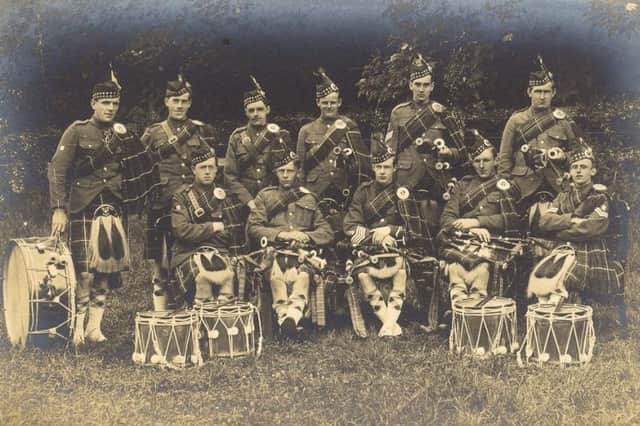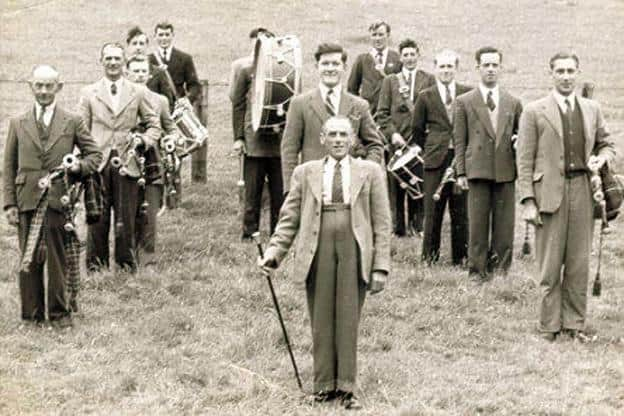History of the Rothbury Highland Pipe Band as it celebrates its centenary


When I moved to Rothbury, everyone said: ‘Oh, you MUST see the Highland Pipe Band on New Year’s Day!’ I thought there must be some mistake. Surely it would be the Northumbrian, not Highland, Pipes played here? How wrong I was.
Important in terms of local history, culture and tradition, RHPB is cherished by the community of Coquetdale and beyond. At every major local event, the band are there. Every country show, summer fair, Remembrance Sunday.
Advertisement
Hide AdAdvertisement
Hide AdIn the past, they also travelled further afield to Durham Miners’ Gala and further still to Japan, Scandinavia, and most of Europe. Members of the band have performed locally, nationally, and internationally.


Let me tell you a little bit about how a Highland Pipe Band was formed in rural Northumberland.
On June 21, 1920, the Rothbury Kilted Pipe Band was formed. Soldiers from the Seaforth Highlanders regiment had been stationed in Coquetdale during the war; deep friendships had grown between the Scottish and local soldiers. The tartan chosen for the kilts was easily decided; The Mackenzie, as this was worn by the Scottish regiment.
Billy Murray tells me: “My uncle, Robbie Murray, started the original band. A clock-maker, with a business in Bridge Street, Robbie was the first to hold the prestigious position of Pipe Major.”
Advertisement
Hide AdAdvertisement
Hide AdAndrew Miller, the current Pipe Major, shows me the Minute Book which details the very first meetings of the Kilted Pipe Band. Formal and reserved, the meetings were chaired by his grandfather (Andrew still plays a rare set of bagpipes, dating from the First World War).
During the Second World War, the band did not perform. After this break, in the 1950s the band we know and love today was formed and renamed ‘The Rothbury Highland Pipe Band’. The first members were the forefathers of many of the current ensemble.
Andrew continues the story: “My grandfather, James Miller, had fought in WW1. He worked as a forester and gardener at Cragside.
"My father was Jim Miller; he was the dispensing chemist in Rothbury for a long time. He was a piper. My uncle, Jack Miller, had been in the army. He became the Drum Major.”
Advertisement
Hide AdAdvertisement
Hide AdThis formation is a little less militaristic, being more interested in music and community. Of course, marching, and playing marches, is still very much part of their repertoire. Their choice of music, though, besides the conventional, is influenced by different Celtic music traditions from several other countries. I was fascinated to learn that there are many types of bagpipes throughout the world.
About 15 years ago, the uniform began to be replaced. Although very distinctive, the first one was heavy, uncomfortable, and outdated.
Out went the huge sporrans, the heavy plaids, the spats and gaiters. The new uniform: white shirts, black waistcoats, Mackenzie tartan kilts, white socks and Ghillie Brogues.
"How did the old uniform feel to wear?” I ask Billy Murray. “Really hot and uncomfortable!” he laughs.
Advertisement
Hide AdAdvertisement
Hide AdI was interested to discover that although RHPB has always comprised members of a core group of Rothbury families (Miller, Murray, Scott, Nixon and Charlton) they are inextricably linked with another pipe band.
Andrew explains: “A chance meeting between Iain MacDonald, the Pipe Major from Neilston, in Scotland, and Rothbury’s Drum Major, Jack Miller, over 40 years ago changed absolutely everything."
Iain had wanted to buy a set of Northumbrian Pipes from the famous Longframlington maker, David Burleigh. So, he and his family came to Rothbury to do that and combined the visit with a holiday.
One evening, as Iain passed the old POW hut, he noticed a sign about the RHPB practices. Asking about this in the Turk’s Head pub, Iain and Jack Miller met. The men became great friends and the two pipe bands developed an extraordinary comradeship and ties, which continue to this day.
Advertisement
Hide AdAdvertisement
Hide AdUnusually, both RHPB and the Neilston Band compose and write some of their own music. Iain and members of the RHPB were instrumental in founding the legendary Rothbury Traditional Music Festival.
The identity of the band is woven into the fabric of Coquetdale and its people, and the band is keen to recruit new members, who members will guide and support.
Andrew tells me: “We do not aspire to play the best, just the best we can for the community. We have a real inclusivity; enthusiasm is as important as talent.”
This spirit is what has won the band the greatest respect and admiration.
Advertisement
Hide AdAdvertisement
Hide AdInstruments played are the bagpipes, the tenor, and the snare drum. The musicians in the band do, however, all play to an extremely high standard.
Stephen Walker, who plays the snare drum, is a world class performer. Lauren Cockburn is an excellent tenor drummer – she took the respected role of Drum Major from David Brown two years ago when he retired, after he had successfully led the band for many years.
In next week’s Gazette, I will be telling you a little more about the relationship with the Neilston Band and about the women in and involved in RHPB. The week after, I will conclude with the history of the now (in)famous World Tour of Coquetdale.